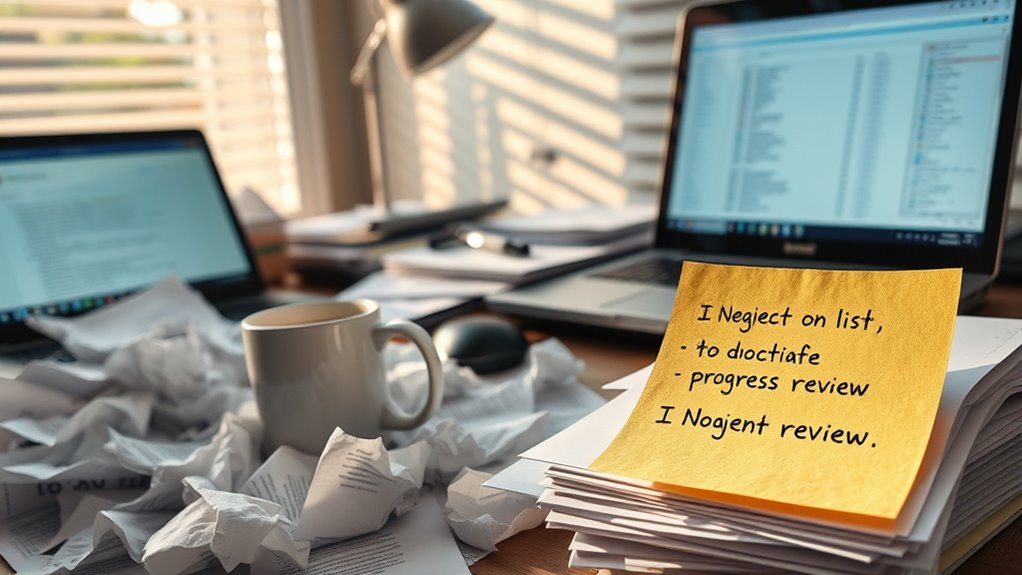Many people rely solely on to-do lists without prioritizing tasks, making it easy to overlook what’s truly important. Overloading your schedule and underestimating time causes stress and burnout, while neglecting breaks hampers focus. Setting vague goals and skipping reflection hampers progress. Multitasking reduces productivity, and refusing to delegate tasks leads to overwhelm. Using ineffective tools or quick fixes instead of habits slows results. Keep these pitfalls in mind to boost efficiency—solutions are closer than you think.
Key Takeaways
- Overreliance on to-do lists without prioritization causes important tasks to be overlooked.
- Overloading schedules and underestimating task durations lead to burnout and missed deadlines.
- Focusing solely on urgent tasks and multitasking reduces productivity and increases errors.
- Ignoring breaks and long-term goals hampers mental health and sustainable progress.
- Using quick fixes and ineffective tools prevents the development of lasting, efficient habits.
Relying Solely on To-Do Lists Without Prioritization

While to-do lists can help you stay organized, relying on them without prioritization strategies often leads to wasted time and missed deadlines. You might check off easy or urgent tasks, but neglect the most important ones that move your goals forward. Understanding task importance helps you focus on what truly matters. Prioritization ensures you allocate your energy efficiently, tackling high-impact tasks first. Without this focus, it’s easy to get caught up in less critical activities, leaving essential work unfinished. To improve your time management, identify tasks based on their urgency and significance. Incorporating lifestyle factors such as sleep and stress management can also enhance your productivity. This way, your to-do list becomes a powerful tool, not just a record of chores, but a guide that directs your efforts toward meaningful progress.
Overloading Your Schedule and Underestimating Time Needed

When you overload your schedule, you risk burnout and falling behind on tasks. Trying to fit too much into unrealistic time blocks makes it hard to prioritize effectively. Recognizing these pitfalls helps you create a more balanced plan that keeps you productive and sane. Incorporating efficient time management techniques can help prevent these mistakes and promote healthier planning habits.
Overcommitment Risks Burnout
Overloading your schedule and underestimating the time each task takes can quickly lead to burnout. When you commit to too many projects or deadlines without realistic planning, the risk of burnout increases. You may start to feel emotionally exhausted as you struggle to keep up with relentless demands. This constant pressure drains your energy and diminishes your motivation, making it harder to stay productive. Overcommitment also leaves little room for breaks or unexpected setbacks, compounding stress levels. To prevent this, learn to set boundaries and prioritize essential tasks. Recognize your limits and avoid saying yes to everything. By managing your commitments wisely, you protect yourself from emotional exhaustion and ensure your work remains sustainable over the long term. Additionally, understanding support networks for new dads can help mitigate feelings of overwhelm and provide valuable assistance when balancing responsibilities.
Unrealistic Time Blocks
Overestimating how much you can accomplish in a given timeframe often leads to unrealistic time blocks that clutter your schedule. This common mistake stems from underestimating how long tasks actually take, causing you to overload your day. These time blocking pitfalls leave little room for unexpected delays or breaks, leading to frustration and missed deadlines. When you set unrealistic scheduling, your plan becomes unmanageable, making it harder to stay focused and productive. Instead, track how long tasks truly take and build buffer time into your schedule. Be honest about your capacity, and avoid the trap of overambition. Creating more accurate time blocks helps you stay on track, reduces stress, and ensures your schedule reflects real-world constraints. Additionally, considering factors like projector contrast ratios can help you better anticipate how long setup and calibration might take, leading to more realistic planning.
Prioritization Challenges
Prioritization challenges often lead to overloading your schedule and underestimating the time needed for tasks. When you focus on urgent tasks without considering task dependencies, you risk creating a backlog. To avoid this:
- Identify tasks based on importance, not just urgency, ensuring you allocate time for dependencies.
- Break large tasks into smaller steps, giving more accurate time estimates.
- Use a priority matrix to balance urgent tasks with important, non-urgent ones, preventing overload.
- Be aware of relationship dynamics that may influence your perception of priorities, helping you maintain focus on what truly matters.
Ignoring Breaks and Downtime

Many people underestimate the importance of taking regular breaks and allowing downtime, believing it wastes valuable time. But skipping breaks can harm your mental health and reduce your overall productivity. Continuous work without pauses leads to burnout, stress, and decreased focus. Ignoring downtime also affects your social life, making you less available for connections and support. When you neglect these pauses, you risk burnout and diminished creativity. Taking short breaks helps refresh your mind, boost energy, and improve mental clarity. It also gives you a chance to reconnect with friends and family, maintaining your social well-being. Remember, breaks aren’t wasted time—they’re investments in your long-term efficiency and happiness. Prioritizing downtime keeps you balanced, healthy, and better equipped to handle your daily tasks. Recognizing the importance of mental well-being ensures you sustain your productivity and overall happiness over time.
Failing to Set Clear and Specific Goals

Without clear and specific goals, it’s easy to drift aimlessly through your day, wasting time on tasks that don’t move you forward. Goal clarity and effective target setting are essential to stay focused and productive. When your goals are vague, you risk losing direction and motivation. To improve, consider these steps:
- Define exactly what you want to accomplish.
- Break larger objectives into smaller, measurable targets.
- Set deadlines to create a sense of urgency and accountability.
- Recognize the importance of goal-oriented planning to maintain focus and track progress effectively.
Not Reviewing or Reflecting on Your Progress

If you don’t regularly review or reflect on your progress, it’s easy to lose sight of your goals and miss opportunities for improvement. Self assessment and progress tracking are essential tools to stay aligned with your objectives. By taking time to evaluate what’s working and what isn’t, you can make informed adjustments to your schedule and strategies. Without reflection, small issues can snowball into bigger setbacks, and you might continue wasting time on ineffective habits. Regular reviews help you celebrate wins and identify areas needing improvement, keeping you motivated and focused. Incorporating a weekly or daily check-in to assess your progress can enhance your common goal tracking pitfalls and ensure your time management remains effective and aligned with your long-term goals.
Underestimating the Power of Routine and Habits

Reflecting on your progress is valuable, but it’s equally important to recognize how routines and habits shape your daily productivity. Many underestimate the power of habit formation and routine consistency, which can profoundly boost your effectiveness. When you develop strong routines, tasks become automatic, freeing mental energy for more critical decisions. To harness this power:
- Establish clear daily habits that align with your goals.
- Maintain routine consistency, even on busy days, to build momentum.
- Regularly review and adjust routines to stay aligned with evolving priorities.
- Incorporate security measures from merchant services to protect your routines and data from potential threats.
Getting Distracted by Multitasking

Have you ever noticed how multitasking can seem like a time-saver, only to leave you more distracted and less productive? When you juggle multiple tasks at once, digital distractions quickly pull your attention away. Constant notifications and switching between tasks disrupt your focus, leading to frequent task switching that hampers efficiency. Instead of accomplishing more, you end up spending extra time reorienting yourself and fixing mistakes caused by divided attention. Multitasking tricks your brain into thinking you’re doing more, but in reality, you’re diluting your focus and increasing errors. Additionally, Kia Tuning options for performance enhancements can be compromised if you don’t stay focused on one upgrade at a time. To fix this, try dedicating specific blocks of time to single tasks, turning off notifications, and resisting the urge to multitask. These strategies help reduce digital distractions and boost your overall productivity.
Neglecting to Delegate Tasks When Possible

Multitasking often feels productive, but it can also lead to burnout and overlooked details. One common mistake is neglecting to delegate tasks when possible. Instead of sharing workload, you try to handle everything yourself, which limits efficiency. To improve your time management, consider:
Effective delegation prevents burnout and boosts productivity by sharing workload.
- Identifying tasks that others can do just as well or better.
- Assigning responsibilities through effective task delegation.
- Embracing workload sharing to lighten your load and increase overall productivity.
- Using Pimple Patches to focus on your priorities without distraction.
Using Ineffective Tools or Systems for Time Management

Choosing the right tools and systems is essential for effective time management, yet many people fall into the trap of using inefficient or unsuitable options. Some rely solely on digital planners that are cluttered or difficult to navigate, while others stick to paper organizers that are outdated or not personalized. Using ineffective tools can lead to missed deadlines, forgotten appointments, and increased stress. Instead, select a system that fits your habits and preferences—whether that’s a simple paper planner for quick notes or a user-friendly digital app that syncs across devices. The goal is to streamline your planning process, not complicate it. Avoid switching tools constantly; instead, master one system that helps you stay organized and focused throughout your day. Incorporating sound healing science principles into your routine can also improve focus and mental clarity, making your time management more effective.
Believing in Quick Fixes Instead of Consistent Habits

Many people hope that finding the perfect time management tool will instantly solve their productivity issues. They fall into the quick fix mentality, seeking instant results instead of building sustainable habits. This mindset leads to short-term gains but long-term frustration. To break free from this cycle:
- Focus on consistent routines rather than quick fixes.
- Recognize that real progress takes time and effort.
- Prioritize small, manageable habits over instant solutions.
Chasing quick fixes might give you a temporary boost, but lasting productivity comes from commitment and steady change. Believing in rapid results can cause disappointment and burnout. Instead, embrace gradual improvements that become part of your daily routine, ensuring sustainable success over time.
Frequently Asked Questions
How Can I Effectively Prioritize Tasks Beyond Just Making a To-Do List?
To effectively prioritize tasks beyond a to-do list, focus on deadline prioritization and task delegation. Break your tasks into urgent and important categories, addressing the most critical first. Delegate tasks that others can do, freeing your time for high-priority work. Regularly reassess your priorities, adjusting as deadlines shift. This approach guarantees you stay focused on what truly matters, maximizing productivity and reducing stress.
What Are the Best Ways to Incorporate Breaks Without Losing Productivity?
Did you know that taking regular breaks can boost productivity by up to 13%? To incorporate breaks effectively, try the Pomodoro Technique—work for 25 minutes, then take a 5-minute active break. During these breaks, stretch, walk, or do quick movements to refresh your mind. This balance prevents burnout, keeps you focused, and makes sure you’re recharged for the next task. Active breaks are key to sustained productivity.
How Do I Set Achievable, Clear Goals for Better Time Management?
To set achievable, clear goals, focus on goal setting using the SMART criteria—Specific, Measurable, Attainable, Relevant, and Time-bound. Break large tasks into smaller steps, making each goal realistic and easy to track. Write down your objectives, prioritize them, and review your progress regularly. This approach keeps you focused, motivated, and guarantees your goals are attainable, ultimately improving your time management skills.
What Strategies Help Me Review and Improve My Time Management Habits?
Like a compass guiding your journey, reflection techniques help you pinpoint where your time slips away. To improve your habits, regularly review your progress and identify patterns. Habit tracking makes this process concrete, showing where adjustments are needed. Set aside time weekly to assess your goals, celebrate successes, and recalibrate. This ongoing reflection keeps you aligned with your priorities, transforming small tweaks into lasting improvements for better time management.
How Can I Develop Sustainable Routines Instead of Relying on Quick Fixes?
You can develop sustainable routines by focusing on habit formation and maintaining routine consistency. Start small, setting achievable goals that you can easily integrate into your daily life. Consistently practice these habits, and over time, they’ll become second nature. Avoid quick fixes by remaining patient and committed, tracking your progress, and adjusting your routines as needed. This steady approach guarantees your routines are sustainable and truly support your long-term time management success.
Conclusion
By avoiding these common mistakes, you’ll transform your time management skills faster than you can imagine. Embrace prioritization, set clear goals, and build consistent habits—your productivity will skyrocket to levels you never thought possible. Remember, mastering time isn’t about quick fixes; it’s about making small, impactful changes every day. Stick with it, and you’ll soon find yourself conquering your schedule like a true time management ninja.









